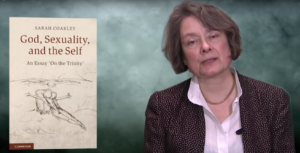Séminaire interconfessionnel de théologie anglophone
Année 2018-19
À la découverte de la « théologie totale » de Sarah Coakley
God, Sexuality and the Self
Théologienne anglicane contemporaine, Sarah Coakley reste méconnue des milieux francophones. Le séminaire permettra aux participant·e·s de travailler ses écrits en langue anglaise. Ils croiseront leurs lectures d’une pensée théologique stimulante, en discernant notamment sa portée œcuménique.
 Née à Londres en 1951, Sarah Coakley est prêtre de l’Église d’Angleterre depuis 2001. Elle a enseigné la théologie systématique à l’université de Lancaster (1976-1991), à Oxford (1991-1993) puis à Harvard (1993-2007). Depuis 2007, elle est titulaire de la chaire Norris-Hulse à l’université de Cambridge.
Née à Londres en 1951, Sarah Coakley est prêtre de l’Église d’Angleterre depuis 2001. Elle a enseigné la théologie systématique à l’université de Lancaster (1976-1991), à Oxford (1991-1993) puis à Harvard (1993-2007). Depuis 2007, elle est titulaire de la chaire Norris-Hulse à l’université de Cambridge.
En s’appuyant sur Romains 8, Sarah Coakley pense la Trinité à partir de l’expérience de la prière contemplative ou charismatique, en accordant une place prépondérante à l’Esprit saint. Ses œuvres abordent aussi des questions séparatrices au sein des Églises chrétiennes et entre elles : ministères féminins, éthique sexuelle, racisme… En faisant dialoguer de manière originale les grands auteurs de la tradition chrétienne (Grégoire de Nysse en particulier) avec des penseurs contemporains (Judith Butler par exemple), Sarah Coakley ferait-elle émerger une via media entre conservatisme et libéralisme ?
Modalités
Le groupe se réunira au cours de l’année universitaire 2018-19, pour huit séances d’1h30, de 18h30 à 20h. La première rencontre se tiendra le mardi 9 octobre 2018. La suite du calendrier (de novembre 2018 à mai 2019) sera établie ensemble.
Après une rencontre introductive, sept autres réunions seront consacrées à la lecture suivie du premier volume de la théologique systématique de Sarah Coakley, God, Sexuality and the Self, en lien avec d’autres livres ou articles de l’auteure. Les participant.e.s seront invité·e·s à présenter à tour de rôle un chapitre, dans la langue de leur choix (anglais ou français). Les discussions auront ensuite lieu en français.
Avec la participation de : Franck Lemaître (Centre d’études œcuméniques Istina, Paris), Katherine Shirk Lucas (Theologicum, Institut catholique de Paris), Jane Stranz (Église protestante unie de France).
Avec le soutien de l’archidiaconé anglican en France (Diocèse en Europe de l’Église d’Angleterre) [1].
En partenariat avec le Centre d’études du Saulchoir.
Pour découvrir en vidéo Sarah Coakley et ses travaux théologiques :
Indications bibliographiques
Livre étudié durant le séminaire
God, Sexuality and the Self. An Essay ‘On the Trinity’ (Cambridge, C.U.P., 2013 ; vol. 1/4 de la théologie systématique).
Table des matières :
Prelude : the arguments of this book
Chap. 1 : Recasting ‘systematic theology’ : gender, desire, and théologie totale
Chap. 2 : Doing theology ‘on Wigan Pier’ : why feminism and the social sciences matter to theology
Chap. 3 : Praying the Trinity : a neglected patristic tradition
Chap. 4 : The charismatic constituency : embarrassment or riches ?
Chap. 5 : Seeing God : trinitarian thought through iconography
Chap. 6 : ‘Batter My Heart’ : reorientations of classic trinitarian thought
Chap. 7 : The primacy of divine desire : God as Trinity and the ‘apophatic turn’
Coda : conclusions and beyond
Pour une première approche, on peut lire l’article de S. Coakley dans le Centro Pro Unione Bulletin (n° 58, 2000, p. 13-17) : The Trinity, Prayer and Sexuality : A Neglected Nexus in the Fathers and Beyond.
Autres ouvrages
Christ without Absolutes. A Study of the Christology of Ernst Troeltsch (Oxford, O.U.P., hbk, 1988 ; pbk, 1994).
Thèse de doctorat de Sarah Coakley sous la direction du prof. Maurice Wiles (Université d’Oxford).
Table des matières :
Introduction
The Nature of Troeltsch’s Relativism
Christology in Troeltsch’s Early Writings : The Disengagement from ‘Ritschlianism’
Troeltsch on God, Redemption, and Revelation
Troeltsch and the ‘Cumulative Case’ against Incarnational Christology
Troeltsch on the Historical Jesus
Troeltsch and the Many Christs
Conclusion
Powers and Submissions. Spirituality, Philosophy and Gender (Oxford, Blackwell, 2002).
Recueil d’articles parus entre 1990 et 2000.
Table des matières :
Prologue
Part 1 : The Contemplative Matrix
Chap. 1 : Kenosis and Subversion : On the Repression of ‘Vulnerability’ in Christian Feminist Writing
Chap. 2 : Traditions of Spiritual Guidance : Dom John Chapman OSB (1865-1933) on the Meaning of ‘Contemplation’
Chap. 3 : Creaturehood Before God : Male and Female
Part II : Philosophical Interlocutions
Chap. 4 : Visions of the Self in Late Medieval Christianity : Some Cross-Disciplinary Reflections
Chap. 5 : Gender and Knowledge in Modern Western Philosophy : The ‘Man of Reason’ and the ‘Feminine’ ‘Other’ in Enlightenment and Romantic Thought
Chap. 6 : Analytic Philosophy of Religion in Feminist Perspective : Some Questions
Part III : Doctrinal Implications
Chap. 7 : ‘Persons’ in the ‘Social’ Doctrine of the Trinity : Current Analytic Discussion and ‘Cappadocian’ Theology
Chap. 8 : The Resurrection and the ‘Spiritual Senses’ : On Wittgenstein, Epistemology and the Risen Christ
Chap. 9 : The Eschatological Body : Gender, Transformation and God
The New Asceticism. Sexuality, Gender and the Quest for God (Londres, Bloomsbury, 2015).
Recueil d’articles parus entre 1998 et 2006.
Table des matières :
Introduction : The New Asceticism
Chap. 1 : Ecclesiastical Sex Scandals : The Lack of a Contemporary Theology of Desire
Chap. 2 : The Woman at the Altar : Cosmological Disturbance or Gender Subversion ?
Chap. 3 : Living into the Mystery of the Holy Trinity : The Trinity, Prayer and Sexuality
Chap. 4 : “Deepening Practices’ : Perspectives from Ascetical Theology on Belief and Practice, Desire and Prayer
Chap. 5 : Beyond Libertinism and Repression : The Quest for a New Anglican Ascetics
Sarah Coakley (éd), Re-thinking Gregory of Nyssa (Oxford, Blackwell, 2003).
« Introduction : Gender, Trinitarian Analogies, and the Pedagogy of The Song », p. 1-13.
Sarah Coakley & Kay Kaufman Shelemay (éds), Pain and its Transformations : The Interface of Biology and Culture (Cambridge MA, Harvard University Press, 2007).
« Introduction », p. 1-16.
« Palliative or Intensification ? Pain and Christian Contemplation in the Spirituality of the Sixteenth-Century Carmelites », p. 77-100.
« Afterword », p. 423-427.
Sarah Coakley & Charles M. Stang (éds), Re-thinking Dionysius the Areopagite (Oxford, Wiley-Blackwell, 2009).
« Introduction », p. 1-10.
Sarah Coakley & Paul L. Gavrilyuk, The Spiritual Senses : Perceiving God in Western Christianity (Cambridge, C.U.P., hbk, 2012 ; pbk, 2013).
« Introduction », p. 1-19.
« Gregory of Nyssa », p. 36−55.
Sarah Coakley & Martin A. Nowak (éds), Evolution, Games and God : The Principle of Cooperation, (Cambridge MA, Harvard University Press, 2013).
« Introduction : Why Cooperation Makes a Difference », p. 1-34.
« Evolution, Cooperation, and Divine Providence », p. 375-385.
Sarah Coakley & Jessica Martin (éds), For God’s Sake : Re-Imagining Priesthood and Prayer in a Changing Church (Norwich, Canterbury Press, 2016).
« Ressurection : The Holy People of God », p. 172-177.
En conclusion d’un livre qui réfléchit à l’avenir de l’Église [anglicane] d’Angleterre, Sarah Coakley fait sienne les deux orientations de Justin Welby, archevêque de Cantorbéry, en rappelant l’importance de la prière du peuple de Dieu et en soulignant la dimension communautaire de la vie de disciple du Christ.
Thomas Merton, Where Prayer Flourishes, Foreword by Sarah Coakley (Norwich, Canterbury Press, 2018).
Foreword, p. xi-xv.
Dans cette préface à l’ouvrage de Thomas Merton (publié en 1969 sous les titres The Climate of Monastic Prayer et Contemplative Prayer), S. Coakley relève l’insistance de Merton sur ce qu’il en coûte de prier (« the costliness of contemplation »).
À paraître
Sin, Racism and the Contemplative Life : An Essay ‘On Human Darkness’ (Cambridge, C.U.P., 2018/19 ; vol. 2/4 de la théologie systématique).
À propos de Sarah Coakley
Janice McRandal (éd), Sarah Coakley and the Future of Systematic Theology (Minneapolis, Fortress Press, 2016).
En langue française
On ne dispose pour l’instant que d’un article de Sarah Coakley : « Sexes et savoir dans la philosophie occidentale. L’ “Homme de raison” et l’ “autre” “féminin” dans le rationalisme et la pensée romantique », in Concilium, n° 238, 1991, p. 105-115.
——————
[1] « The French Archdeaconry of the Diocese in Europe welcomes this initiative to study one of the Church of England’s leading systematic theologians » (Archidiacre Meurig Williams).
